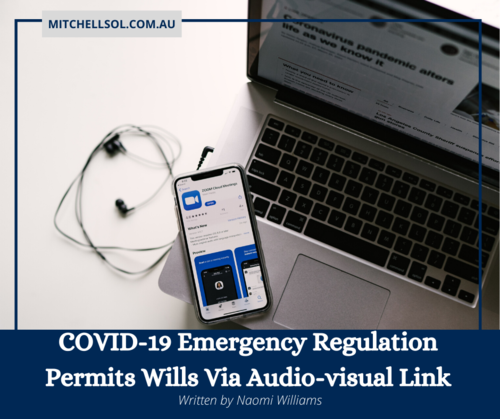COVID-19 Emergency Regulation Permits Wills Via Audio-visual Link
Written by Naomi Williams
The law of wills and estates is not typically a rapidly changing field, but much is unprecedented about life during the coronavirus pandemic.
On 14 May 2020 the Governor in Council made an emergency regulation permitting the remote signing and witnessing of wills via audio-visual link. The following Monday, it was necessary for Mitchells Solicitors to employ the new Regulation.
Substitute Signatory: “Do you wish for me to sign this, your Will, on your behalf?”
Will Maker: “Yes, I do.”
Special Witness: “Substitute Signatory, can you please turn your camera a little so I can see you signing each page of the Will.”
It was indeed unprecedented.
Ordinarily, the Court cannot presume that a Will is valid unless, amongst other things, there are two independent adult witnesses in the physical presence of the will maker who observe the will maker sign, evinced by the witnesses contemporaneously signing the Will. This is an important protection against fraudulent Wills or Wills made under duress.
Of course while researchers continue to seek a COVID-19 vaccine, the physical presence of witnesses can pose a serious health risk.
The new Justice Legislation (COVID-19 Emergency Response—Wills and Enduring Documents) Regulation 2020, already expanded in its operation to be the Justice Legislation (COVID-19 Emergency Response—Documents and Oaths) Regulation 2020, is a temporary regulation only. It is set to expire on 31 December 2020. The Regulation ensures that those who have good reason to stay locked-in are not locked out of the law.
The emergency Regulation is a particularly welcome introduction for members of our community who are more vulnerable due to their age or existing health concerns, and those who are subject to current visitor restrictions.
The Emergency Regulation
Under the Regulation, the Court will presume that a Will is valid if signed and witnessed via audio-visual link in strict compliance with the Regulation. A will maker may give instructions for the Will via audio-visual link and proceed to do one of the following:
- sign the paper Will themselves; or
- instruct a Substitute Signatory via audio-visual link to sign on their behalf (as occurred above). The Substitute Signatory must be an Australian Legal Practitioner or employee of the Public Trustee.
Either option must occur within the presence of one or two witnesses via audio-visual link in real time, at least one of whom must be a Special Witness. A Special Witness may be:
- an Australian legal practitioner; or
- a notary public; or
- a justice or commissioner for declarations specifically approved by the chief executive for this purpose, or otherwise employed by the law practice who prepared the document; or
- if the Public Trustee prepared the Will, an employee of the Public Trustee.
The emergency Regulation must not to be followed without caution. Additional obligations placed on the Special Witness provide some protection against fraudulent Wills or Wills made under duress:
- The Special Witness must take reasonable steps to verify the identity of the will maker;
- They must be satisfied any Substitute Signatory is appropriately authorised and directed;
- They must be satisfied the will maker is freely and voluntarily directing the Substitute Signatory;
- The Special Witness (and the second witness if applicable) must confirm the original document or a true copy of the document as soon as practicable by signing each page;
- The Special Witness must sign a Certificate in accordance with section 21 of the Regulation, which sets out the circumstances of signing. This must be kept with the Will.
Similar provisions now apply to the remote signing and witnessing of Power of Attorney documents, Affidavits, Statutory Declarations, Oaths, Deeds and particular mortgages.
In these unprecedented times, a specialist estate planning lawyer can ensure you validly sign a Will and Enduring Power of Attorney without putting your health at risk.
The emergency Regulation is employing the capabilities of technology to ensure you have continuing access to the legal system. Our estate planning specialists at Mitchells Solicitors will step you through the process and ensure that your wishes are legally and validly documented for your peace of mind.

Naomi started with our firm as a work experience student in 2013. Impressing us immensely, she was offered and accepted the position of Law Clerk in 2014. She quickly gained skills in the administration of deceased estates, property transactions, and advocating and negotiating in estate disputes.
In 2017, Naomi received her Bachelor of Laws and Bachelor of Arts (Psychology and Media Studies) from the University of Queensland, and received her Graduate Diploma of Legal Practice from the College of Law. Her admission to the Supreme Court of Queensland in 2018 could not come soon enough, and she transitioned seamlessly to the role of solicitor at Mitchells.

